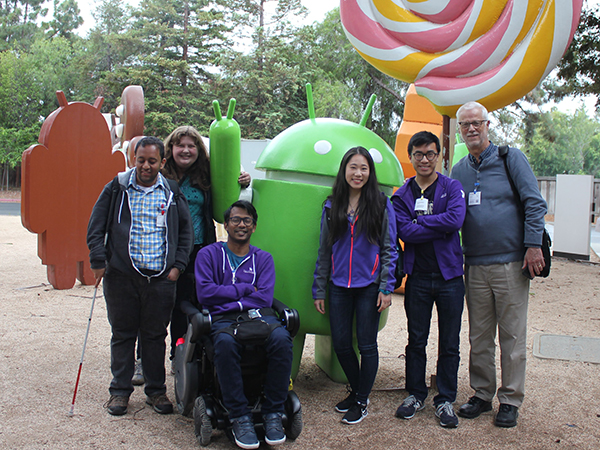The following post was authored by Richard E. Ladner, Professor Emeritus at the Allen School and Principal Investigator of AccessComputing

Five students from the Allen School joined a group of 25 students from seven different universities who traveled to Silicon Valley last month to participate in the Teach Access program Study Away Silicon Valley (SASV). I led the group from the University of Washington and served as one of six faculty mentors for the small group projects that participating students completed during the five days of SASV. The students visited the accessibility teams at Walmart, Google, Microsoft, Apple, Verizon Media Group (Yahoo!), and Facebook, where they learned how each of these companies are making their products and services more accessible and usable.
The delegation included Allen School Ph.D. students Venkatesh Potluri and Ather Sharif, fifth-year masters student Nicole Riley, and undergraduates Lucy Jiang and Bryan Lim. In addition to the goal of increasing their knowledge of accessibility practices, these students plan to help the Allen School to improve its curriculum to include more about accessibility-related technologies and practices that these companies are looking for in the people they hire.
Ather observed that SASV will be helpful for his research. “SASV was a truly remarkable experience. It was fascinating to learn about the efforts and initiatives put forward by the tech companies to improve accessibility in their organizations and products. This knowledge will help me tremendously in my research in not only finding the right problem to target but also targeting it with a pragmatic approach.”
Venkatesh also anticipates that what he learned at SASV will benefit his research. “As a graduate student with research focused in accessibility, it was invaluable to understand the different approaches the industry had towards accessibility. I hope to use these insights from the Study Away as inspiration to solve meaningful accessibility gaps.”
As Bryan noted, there is a gap between what new employees know about accessibility coming into these companies, compared to what they need to know to be effective employees. “Being a part of SASV made me realize the magnitude of the task to make products and services accessible to all. Even more surprising was that almost every company mentioned the existence of a skills gap. New employees consistently had little to no experience with accessibility, and many of the people on their accessibility teams learned on the job. Knowing this, I think that teaching students about accessibility will give them a leg up no matter where they go.”
For her part, Nicole appreciated hearing firsthand about the importance of accessibility to employers and the opportunities available for researchers and technologists who focus in this space. “One thing I learned on the trip was how valuable skills are in accessibility to companies in Silicon Valley. I also learned about the variety of roles available in which you can do accessible work and the diversity of paths to get there, along with new accessible technology that they were developing.”
Lucy also was impressed by each company’s respective commitment to accessibility. “It was so impactful to visit companies like Google, Microsoft, and Facebook and learn about not only their work in accessibility, but their commitment to continual growth and progress. From learning about the importance of universal design, to thinking outside the box and working with a group of people of diverse backgrounds to develop a product idea, I’ll always cherish my newfound friendships with students and faculty from universities across the country. Though this trip was just one week long, I’m inspired to become even more involved in this field — after all, accessibility is our responsibility.”
Next spring, Teach Access is planning another SASV. I am already looking forward to assembling another group of students eager to participate in this enriching learning experience and to incorporate accessibility practices and technologies into their own work. And hopefully we can host a Study Away Puget Sound (SAPS) in the future!

